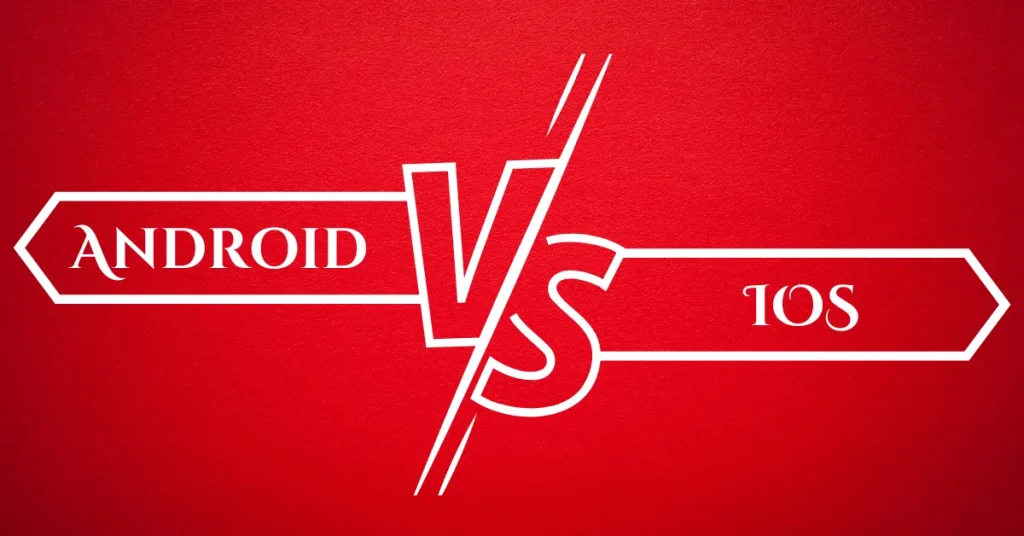Choosing a smartphone is a big decision. It’s important to know the difference between android and ios. Each has its own features, and picking the right one is key.
The difference goes beyond just the operating system. It’s about how you use your phone. From how it works to how it looks, there are many differences. Knowing these can help you pick the best phone for you.

We’ll look at the main differences between android and ios. We’ll talk about what makes each special. This way, you can choose the best phone for you.
Introduction to Smartphone Operating Systems
Smartphone operating systems are very important. The choice between android and ios is a big one. It’s not just about tech, but also about how you use your phone.
Key Takeaways
- Understanding the difference between android and ios is key when picking a smartphone.
- The differences go beyond the operating system to the user experience.
- Important differences include how the system works, market share, and design.
- Knowing these differences helps you get the most from your phone.
- Exploring these differences helps you understand what each offers.
- The right choice depends on what you need and like.
Understanding Mobile Operating Systems Basics
When we talk about android vs ios, we need to know the basics. Both Android and iOS have special features. Android is open-source, while iOS is closed-source.
Android was first released in 2008. iOS came out in 2007. Both have grown a lot, adding new features and improving security.
The android vs ios debate also looks at the devices they run on. Android devices come from many makers like Samsung and Google. iOS devices are made only by Apple. This means Android offers more choices, while iOS gives a more unified experience.
| Operating System | Release Year | Development Approach |
|---|---|---|
| Android | 2008 | Open-source |
| iOS | 2007 | Closed-source |
In conclusion, knowing the basics of mobile operating systems is key. By looking at the android and ios contrast, users can pick the best one for them.
Also Read: Marketing vs Advertising: What’s the Difference?
Market Share and Global Presence
The battle between Android and iOS has been ongoing for years. Android leads with over 70% of the market. iOS, on the other hand, has a strong following in the U.S. and other rich countries.
Android wins because its phones are cheaper. This makes them more affordable for many people. Also, Android has more apps than iOS. This is thanks to the Google Play Store’s bigger app selection.
Research shows the market share fight will keep changing. Countries like China and India are growing fast. They will help both Android and iOS grow. It’s exciting to see how smartphones will change in the future.
The global smartphone market is a complex and dynamic landscape, with many factors influencing the android vs ios market share. As we look to the future, it’s clear that both operating systems will continue to play a major role in shaping the industry.
The Core Difference Between Android and iOS
Choosing a smartphone means picking between Android and iOS. These two have many differences. Android is open-source, letting you customize it a lot. iOS is closed, making it secure and easy to use.
Android lets developers make their own versions. This means many devices with different features and prices. iOS is made by Apple only. This means all devices work the same way.
| Feature | Android | iOS |
|---|---|---|
| Operating System Architecture | Open-source | Closed ecosystem |
| Software Development Approach | Customizable, open-source | Exclusive, closed-system |
| Update and Support Systems | Slower updates, more vulnerabilities | Timely updates, secure |
In short, Android and iOS differ a lot. They have different systems, ways of making software, and how they update and support devices. Knowing these differences helps you pick the best smartphone for you.
Read More: DNA vs RNA: Understanding the Key Differences
User Interface Design Philosophy
The design of Android and iOS is very different. Android lets users change their screens and settings a lot. iOS, on the other hand, is simple and easy to use.
Navigation is another big difference. Android lets you change how you move around, but iOS keeps it the same. This shows Google and Apple’s different ways of thinking.
Both Android and iOS look different. Android’s Material Design is bright and bold. iOS is simple and clean. The look of the interface affects how users feel about each platform.
| Platform | Design Approach | Navigation System | Aesthetics |
|---|---|---|---|
| Android | Flexible and customizable | Customizable navigation | Material Design language |
| iOS | Streamlined and intuitive | Standardized navigation | Minimalist and sleek design |
Customization and Flexibility Options
Customization is a big difference between Android and iOS. Android lets users change their home screens and more. They can use launchers and icon packs for this.
iOS has fewer options for changing things. It focuses on a simple user experience. This makes it easy for new users but limits those who want more control.
iOS does let you change wallpapers and add widgets. But Android offers more ways to customize your device. So, Android is seen as more flexible.
Learn More: What is Difference Between web development and web design
Choosing between Android and iOS depends on what you want. If you like to customize, Android might be better. If you prefer simplicity, iOS could be the choice. Think about what you need before deciding.
Security and Privacy Features
Android and iOS have their own strengths and weaknesses when it comes to security. Android is open-source, which means users can customize it a lot. But, this openness also makes it more vulnerable to malware.
iOS, on the other hand, is a closed system. This gives it an extra layer of security. It’s like a safe house for your data.
Android devices often get updates later than iOS. This can leave them open to threats. But, Google is working hard to fix this. Now, many Android devices get regular security updates.
Both platforms collect data, but iOS is seen as more private. This is because iOS is more careful about who gets your information.
Both Android and iOS use facial recognition and fingerprint scanning for security. But, iOS makes all data encrypted by default. Android needs users to turn encryption on themselves.
Security is very important for both Android and iOS. They have both made big improvements. But, the choice between Android and iOS depends on what you need and like.
App Ecosystem and Store Differences
The debate between android and ios app stores is ongoing. Each has its own strengths and weaknesses. Android and ios apps differ in policies, features, and user experience.
The Google Play Store and the App Store handle apps differently. This affects the quality and variety of apps available.
The App Store has strict rules and a careful review process. This leads to a more curated app selection. In contrast, the Google Play Store is more open, allowing more apps. This means more variety but also raises concerns about app quality and safety.
Both stores have ways to help users find new apps. The Google Play Store uses ratings, downloads, and search queries. The App Store looks at user engagement and app quality. Knowing these differences helps developers and users.
App Quality and Curation
App review and approval are key to keeping apps safe and good. The App Store’s strict rules mean higher-quality apps. The Google Play Store’s openness leads to more apps, but some may be lower quality.
Hardware Integration and Device Options
Choosing between android and ios devices is important. Android offers many devices, from cheap to expensive. This means you can find something that fits your budget and needs.
iOS devices are made by Apple only. This makes the experience smooth but limits your choices. You can’t pick from as many devices.
The following table compares some key features of android and ios devices:
| Feature | Android | iOS |
|---|---|---|
| Device Variety | Wide range of devices from multiple manufacturers | Limited range of devices from Apple |
| Customization | Highly customizable | Limited customization options |
| Price | Wide range of price options | Premium pricing |
Choosing between android and ios depends on what you want. Think about the devices and prices. This helps you pick the best one for you.
Cost Considerations and Value Proposition
Choosing between Android and iOS devices means thinking about cost. The debate on android vs ios cost is ongoing. Each side has its own pros and cons. The cost of a device is just the start, as apps and accessories can add up.
Looking at the value of android and ios is key. Android might be cheaper at first, but iOS holds its value better. This means iOS might be a smarter choice for resale value.
Device Pricing Comparison
Device prices between Android and iOS show interesting trends. Android prices vary a lot, from cheap to very expensive. iOS devices are often pricier but offer a smoother experience.
Long-term Investment Analysis
Thinking about the long-term cost of Android and iOS is important. It’s not just the first price, but also ongoing costs like apps and maintenance. The android vs ios cost debate is complex, with no clear answer.
Resale Value Differences
iOS devices tend to keep their value better, making them a good choice for resale. The value of android and ios is a big factor for those buying new devices.

| Device | Initial Purchase Price | Resale Value |
|---|---|---|
| Android | $500-$1000 | $200-$500 |
| iOS | $1000-$1500 | $500-$1000 |
In conclusion, the cost and value of Android and iOS devices are complex. By looking at the first price, ongoing costs, and resale value, you can choose wisely.
Performance and Battery Management
Android and iOS have their own good points. Android lets you change things a lot and has different hardware. But, iOS works well with other Apple stuff and has great software.
Battery life is important too. Android often lasts longer because you can change how it saves power. But, iOS has gotten better, with features like low-power mode.
Processing power is also key. Android devices usually have stronger processors. But, iOS makes up for it with better software and hardware together. This means iOS can be as fast as Android, even with less powerful hardware.
| Device | Battery Life |
|---|---|
| iPhone 13 | Up to 12 hours |
| Samsung Galaxy S22 | Up to 14 hours |
| Google Pixel 6 | Up to 12 hours |
Choosing between Android and iOS depends on what you need. Both have good and bad sides. The best choice is what fits your life best.
Integration with Other Devices and Services
Android and iOS have their own ways of working with other devices and services. Android works well with Google services like Google Drive and Google Photos. iOS, on the other hand, is great with Apple devices like Macs and iPads.
Both systems aim to make everything work together smoothly. This means you can start something on one device and finish it on another. But, using only one system can feel limiting.
Despite the limits, having everything work together is very helpful. You can share files and photos easily across devices. It’s a convenient way to use your devices.
Ecosystem Lock-in Effects
Ecosystem lock-in has both good and bad sides. It makes things work together well but limits your choices. It can be hard to switch to a different system.
Cross-platform Compatibility
Being able to use your stuff on different devices is key for both Android and iOS. It lets you access your files and photos on various devices. This is very important for people who use many devices.
Gaming and Entertainment Experience
Android and iOS have their own good and bad points when it comes to gaming. Android has more devices, but they can play differently. iOS devices usually play games better and more consistently.
The processor is very important for gaming. Android uses processors from Qualcomm and MediaTek. iOS uses Apple’s A-series chips. Android’s GPUs come from Adreno and Mali, while iOS uses Apple’s custom GPUs.

Both platforms have games you can’t find on the other. For example, iOS has “Clash of Clans” and “Asphalt 9: Legends”. Android has “PUBG Mobile” and “Fortnite Mobile”. But, many games like “Candy Crush Saga” and “Pokémon Go” are on both.
| Platform | Exclusive Titles | Popular Games |
|---|---|---|
| Android | PUBG Mobile, Fortnite Mobile | Candy Crush Saga, Pokémon Go |
| iOS | Clash of Clans, Asphalt 9: Legends | Candy Crush Saga, Pokémon Go |
Choosing between Android and iOS for gaming depends on what you like. Both offer lots of games and fun. The best choice is based on what device and gaming experience you want.
Privacy and Data Management Practices
Android and iOS have their own ways of handling privacy. They aim to keep your data safe while making things easy for you. You can choose what info you share and how.
These systems collect data like where you are, what you browse, and which apps you use. This info helps make things more personal, like ads and suggestions. But, you can stop sharing this data by changing your settings.
Data Collection Policies
Android and iOS collect data in different ways. Android uses Google services like Maps and Search. iOS uses Apple services like Siri and Music.
User Control Over Information
You can control your data on both Android and iOS. You can set your privacy settings, like location and app permissions. You can also use private browsing to keep your info safe.
In short, both Android and iOS protect your privacy while making things easy. Knowing how they collect data and how you can control it helps you stay safe and enjoy your device.
| Operating System | Data Collection Policies | User Control Options |
|---|---|---|
| Android | Google services, such as Google Maps and Google Search | Manage privacy settings, such as location services and app permissions |
| iOS | Apple services, such as Siri and Apple Music | Manage privacy settings, such as location services and app permissions |
Conclusion
Choosing between Android and iOS is not easy. It really depends on what you like and need. Android lets you change things a lot, while iOS is simpler and safer.
Android fans like being able to change their phone a lot. iOS users like how easy it is to use and how well it works with other Apple stuff. What’s best for you depends on what you want and can afford.
FAQ
What is the difference between Android and iOS?
Android and iOS are top mobile operating systems. They differ in architecture, software, customization, security, apps, and device integration.
What are the advantages and disadvantages of Android compared to iOS?
Android lets you customize more and offers many devices at various prices. iOS gives a smooth experience, strong security, and works well with Apple products. Your choice depends on what you prefer.
How do the app ecosystems and app stores differ between Android and iOS?
The Google Play Store and App Store have different rules and app choices. Android has more apps, including custom and sideloaded ones. iOS focuses on quality and security.
Which platform has better security and privacy features?
iOS is seen as more secure with encryption, updates, and strict app control. Android has improved but faces challenges with many devices and app sources.
How do Android and iOS differ in terms of hardware integration and device options?
Android works on many devices from various makers, giving more choices. iOS is only on Apple devices, for a unified experience.
Which platform is more cost-effective in the long run?
The cost of Android and iOS devices varies. Android is often cheaper upfront. But iOS might be more valuable over time.
How do the performance and battery management differ between Android and iOS?
Both have improved in performance and battery life. Android offers more choices, while iOS has a unified experience. The best choice depends on your device and use.
How do Android and iOS differ in terms of integration with other devices and services?
Android works well with Google services and other Android devices. iOS integrates well with Apple products, creating a unified experience.
Which platform offers a better gaming and entertainment experience?
Both Android and iOS are great for games and entertainment. The best experience depends on device quality, display, and exclusive titles.
How do Android and iOS compare in terms of privacy and data management practices?
Both have improved privacy and data management. iOS offers more control over data. Android’s open nature and diverse ecosystem pose challenges.



